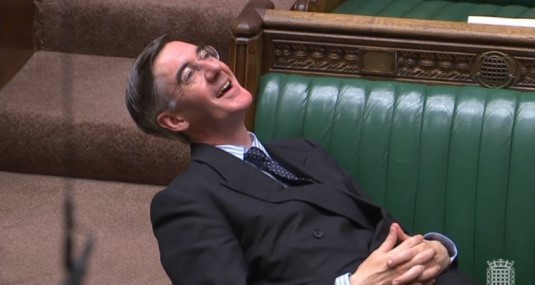The Tory Politics of Back to Work

This isn't just a property of the PartyGate saga: it's a feature characteristic of Conservative Party politics lately. The war on woke, the difficulties over "levelling up", the endless demonisation of refugees - unless they're Ukrainian. They have the privilege of navigating the Home Office's Kafkaesque bureaucracy. And another Tory hobby horse recycled its way back onto the front page of the Telegraph this morning: people not being in the workplaces. This time, Jacob Rees-Mogg is having a go: he's issued an expectation that civil servants should be back at their desks now that we're "learning to live with Covid." Just don't talk about the 482 reported dead over the last 24 hours.
The report discusses departmental league tables showing the Departments of International Trade and Health at the top with 73% and 72% back in on any given day, while at the bottom are the DWP at 27% and Education at 25%. In fact, what the report doesn't say is most civil servants are heading back to the offices with most being expected to come in at least twice a week. Quoting Lucille Thirlby of the First Division Association, the union of senior officials, she said "If they are still delivering the work of the department, the minister and the government of the day, why does it matter where people work from? Why does that concern ministers?"
What is Rees-Mogg's argument? It's very similar to points repeatedly made by Rishi Sunak. We need to "realise the benefits of face-to face, collaborative working", ensure taxpayer value, and "the wider benefits for the economy." The Conservative Friends of Costa strike again. Given how city centre economies are hugely dependent on so-called anchor institutions, landlords big and small, as well as franchise holders and shopkeepers need the at-work spend of civil servants. And as they disproportionately support the Tories, the government has to throw them a bone.
But there are wider politics too. The first directly impinge on class relations. For all the utopian talk of the death of the office in the early phases of the pandemic, having people working from home and managing their work at their pace was always going to induce chills and sweats among hyper class conscious layers of Tory politicians. For one, without constant supervision by watchful managers they might spend time doing things other than their work. Stuff like spending more time with their family, taking time off in the day to binge watch a box set or muck around on the internet. Even worse, some might discover how much of their work is entirely unnecessary and that divorced from the context of the workplace appears nothing more than a time sink at best, or at worse an example of anti-production - tasks that are pointless apart from being a manifestation of work discipline and control. For millions of workers, not just in the civil service, the transition from at-home work to flexible working suits their lives better and allows for self-organisation. Something any Tory would find hard to stomach: if work is set up to suit them, what demands might they make next?
In addition to keeping the political imaginary tightly circumscribed, there are the more conventional politics to consider - which scream loudly from the Telegraph's reportage. This comment from a "Whitehall source" leap out:
The whole of the country is getting back to normal. This feels out of step with the rest of the country – who after all pay for the existence of the civil service – who have been back in their offices working very hard for quite a while now.It's our old friend divide and rule. With the Tories beset by crisis, there are perceived political profits to be had from attacking the civil service as feckless and lazy. Setting them up as an out group worked well when the Tories came for them in the 1980s and 90s, and during the Dave and Osborne austerity years, so there is a folk memory, albeit one that only resonates among core supporters, to draw from. But if the civil service unions dig their feet in, and they should, there's an opportunity for more beggar-thy-neighbour politics. You're going into work, so why should they get to stay at home? An industrial dispute fought on these sorts of terms is a story that writes itself for the tabloids, and gives the Tories a chance to condemn Labour over its relationship to the unions - even though none of the civil service unions are affiliated to the party. Who cares about the details? This is a handy fight to provoke if the only feasible political strategy the Tories have left is a core vote plus Brexit vote gambit, hoping those who supported them in 2019 can be kept aboard by dirty tricks and scapegoating.
There is another side of it – it feels that, in some cases, it is a minority of really hard-working officials who are in the office all the time and a silent majority of people aren't pulling their weight.
Could it work? The fight over deporting asylum seekers, the government's drip, drip attacks on trans people, the scraps with the liberal establishment, and every other bit of friction the government are working up into a blaze are all distractions. In the short term they're there to protect Johnson, but in the longer term it's about keeping them in office by, effectively, ensuring everything is debated and dissected except for their record.
Image Credit